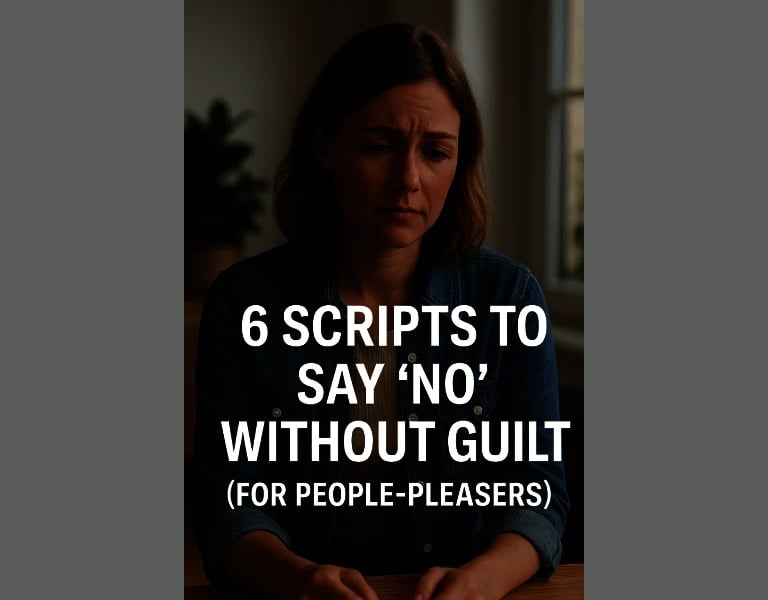6 Scripts to Say ‘No’ Without Guilt
Get 6 scripts to say ‘No’ without guilt. Set boundaries, reduce stress, and protect your peace. Simple tips inside!
RELATIONSHIPS & BOUNDARIES
E.O. Francis
6/21/20255 min read


Learning to say ‘No’ without guilt can be a big step, especially for people pleasers. Many find it hard to turn down requests. You might worry about letting others down or appearing unhelpful. This guide offers simple scripts to help you protect your time and energy. Saying no is a vital part of self care and setting healthy boundaries for better personal well being. These tools will empower you to decline requests respectfully.
Why Saying No Feels So Hard for People Pleasers
For many people pleasers, the thought of saying no can bring on strong feelings of anxiety. This often comes from a deep desire to be liked and accepted by everyone. You might believe that agreeing to every request makes you a good friend, partner, or colleague. The fear of disappointing someone or causing conflict can be powerful. This pattern, however, can lead to feeling overwhelmed, stressed, and even resentful. Constantly putting others' needs before your own can drain your energy. It can also make it difficult to focus on your own goals and happiness. Understanding these underlying reasons is the first step toward change.
The Power of a Polite 'No'
Learning to say no is not about being selfish or unkind. It is about recognizing your own limits and valuing your time and energy. A polite refusal actually protects your well being and allows you to be more present for the commitments you do choose. When you clearly communicate your boundaries, you teach others how to treat you. People will begin to understand and respect your limits. This creates healthier, more balanced relationships where your needs are also considered. A thoughtful 'no' can be far more respectful than a reluctant 'yes' followed by poor performance or resentment.
6 Scripts to Say ‘No’ Without Guilt
Script: "Thank you for thinking of me. I can't commit to that right now."
Analysis: This script is polite, clear, and direct. It acknowledges the request and expresses gratitude, which softens the refusal. By stating "I can't commit to that right now," you avoid making excuses or opening the door for negotiation. This response is perfect for situations where you want to be firm but kind, without offering too much personal information. It respects your own capacity and the other person's request simultaneously.
Script 1: The Simple and Direct Approach
Here are six simple scripts you can use. They help you say ‘No’ without guilt. Practice them so they feel natural when you need them. Remember, you do not always need to give a long explanation for your decision.
Script 2: Highlighting Your Current Capacity
Script: "My plate is pretty full at the moment. I won't be able to give that the attention it truly deserves."
Analysis: This script effectively communicates that your resources are currently allocated elsewhere. It frames your 'no' not as a rejection of the task or person, but as a responsible assessment of your ability to perform well. Mentioning that you cannot give it "the attention it truly deserves" shows you care about quality. This can make the other person feel understood, even though you are declining their request. It reinforces that your refusal is about capacity, not willingness.
Script 3: Focusing on a Mismatch
Script: "That sounds interesting, but it's not a good fit for me at this time."
Analysis: This is a great script when a request genuinely doesn't align with your skills, interests, or current priorities. It politely deflects the request without criticizing it. The phrase "not a good fit for me" is subjective and personal, making it hard to argue against. Adding "at this time" offers a subtle hint that things might be different in the future, if you wish to leave that possibility open, but it is not a promise. This script maintains a positive tone while firmly setting a boundary.
Script 4: Buying Yourself Some Time
Script: "I need to check my schedule and other commitments. Can I get back to you by [specific time/day]?"
Analysis: This script is useful when you feel pressured or unsure in the moment. It allows you to pause and thoughtfully consider the request instead of giving an immediate, possibly regrettable, 'yes'. By offering to get back by a specific time, you show responsibility and respect for the other person's request. This break gives you the space to decide if you truly can or want to say yes, and if not, to prepare one of the other scripts to deliver your 'no' calmly.
Script 5: Stating Your Priorities
Script: "I'm focusing on [your key priority/project] right now, so I have to say no to new things."
Analysis: This script is effective because it clearly states you have existing commitments that take precedence. Sharing a general sense of your priority (without oversharing details) helps the other person understand your decision is based on prior plans. It shows you are organized and deliberate about how you spend your time. This method can also inspire others to respect your focus and dedication to your current goals. It shifts the reason for the 'no' from the request itself to your existing commitments.
Tips for Delivering Your 'No' Effectively
Script: "I wish I could help with that, but I'm unable to at this time."
Analysis: This script expresses empathy ("I wish I could") while being unequivocally firm ("I'm unable to"). It is polite and does not invite further discussion or negotiation. You are not offering excuses or lengthy justifications, which often makes it easier for people pleasers to stick to their 'no'. The phrase "at this time" provides a soft boundary without over committing to future possibilities, keeping your options open. This is a very good general purpose script for many situations.
Script 6: The Gentle and Firm Closure
Saying no is a skill. Like any skill, it gets easier with practice. Keep your responses simple and clear. You do not need to over explain or make up elaborate excuses; this often just makes you feel more guilt. Be firm in your decision, but always maintain a polite and respectful tone of voice. Before you respond to a request, quickly remind yourself why you need to say no. Perhaps you need more rest, time for your own projects, or to avoid burnout. Knowing your 'why' will give you more confidence.
Reclaim Your Time and Peace
Learning to say ‘No’ without guilt is a powerful act of self respect. It helps you manage your energy and avoid feeling overwhelmed. By using these scripts, you can set healthy boundaries in your relationships. This allows you more time and focus for the things that truly matter to you. Start practicing today, and notice how much more peaceful and in control you feel. You deserve to protect your time and your well being.


KitchenAid Deluxe 4.5 Stand Mixer, Contour Silver


Sonos Ace Wireless Noise Canceling Over Ear Headphones, White


